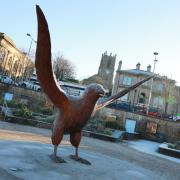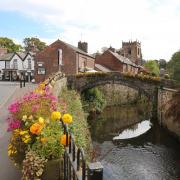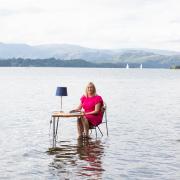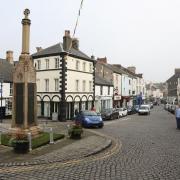There’s plenty to smile about in Lytham and St Annes where even a tough summer for the beaches could have a silver lining.

This has been a busy year for Lancashire’s beaches. Crowds flocked to the coast during lockdown as the sun blazed down and furloughed parents made the most of the weather while children enjoyed traditional fun and games on the sand.
But as the beaches cleared and the car parks emptied, the amount of rubbish left behind became apparent. Thousands of items were littered across the sands every day, abandoned for someone else to deal with.
Among those who have helped to clear the staggering collection of rubbish are the Love My Beach volunteers who patrol stretches of the Fylde coast.
‘Our teams have collected about four times as much litter in recent months,’ said Emily Parr who co-ordinates the volunteer teams. ‘We would typically expect to collect about 9000 bags in a normal year across the Fylde coast.

‘There is no limit to what people will leave on a beach, we’ve found barbecues, the remains of picnics, chairs, tables, rugs... anything you can imagine someone taking to the beach, we’ve found after they’ve left.
‘This has been a very difficult time for beaches but in the long run I’m hopeful we can turn it to our advantage. There has been a lot of coverage of the problem of litter on the beaches and we now have a waiting list of people who want to get involved to help.’
Emily grew up in Poulton and worked in marine conservation in Mexico before returning to the Fylde coast. She now marshals a regular team of 250-or-so volunteers, who are joined each year by about 900 who take part in one-off litter picks. In the two-and-a-bit years she has been working for Keep Britain Tidy, she says the oddest finds she has made have a been the corpse of a two foot long iguana and an, ahem, ‘adult’ doll.
The litter collections were paused in the early weeks of lockdown but since socially-distanced teams of six resumed their activities in June, they have found enormous quantities of litter and, in particular, plastic beach toys.

‘One group alone found 133,’ added Emily. ‘It shows something of the mindset of the people who are leaving these items. You can buy a set of four plastic beach toys for £1 and as long as ridiculously cheap plastics are available, people are not going to attach much value to them and it’s not going to matter too much if they don’t take them home.
‘David Attenborough and the Blue Planet series raised awareness levels and almost overnight people suddenly understood the problem of single use plastics in the ocean – but that doesn’t mean they do anything to stop it. Our message to anyone visiting a beach is very clear: Leave only your footprints behind. If you can carry things to the beach, you can carry them away again later as well.
‘The beach is something to celebrate and people should take pride in it and want to maintain it. It has a significant impact on the local economy because people will visit a nice beach from miles around and will pump money into the shops, bar and restaurants in the area.
‘There’s an amazing array of species in the sea and on the dunes, too, so the beaches are important on a lot of levels and everyone can do their bit to make them a safe and enjoyable place.’



























